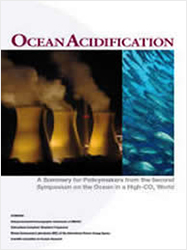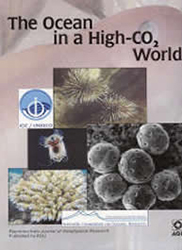

The Scientific Committee on Oceanic Research (SCOR) was involved in an April 2001 workshop on ocean fertilization convened by the American Society for Limnology and Oceanography (ASLO) in Washington, D.C. Concern was growing at that time about various plans to fertilize the ocean with iron to increase phytoplankton growth and to enhance sequestration of carbon dioxide from the atmosphere to the ocean, as a means to slow the increase of atmospheric carbon dioxide and consequent global warming. Recommendations from the meeting included the following:
ASLO and other partners should initiate plans to convene an internationally sponsored symposium to address the role of marine primary productivity in climate change, including natural events and intentional fertilization of the ocean. The symposium should bring together appropriate scientific and policy experts to summarize the scientific and legal uncertainties behind ocean fertilization. …the international scientific community should start to develop a code of practice for guiding ocean fertilization research. ASLO should approach other scientific organizations (e.g., the Scientific Committee on Ocean Research, SCOR) and societies to initiate the formation of these guidelines.
In November 2001, the SCOR Executive Committee agreed that SCOR should convene an international symposium on the science of ocean carbon sequestration, including ocean fertilization and deep-ocean injection of carbon dioxide, to identify what was known at the time and what information was still needed to determine the feasibility and risks of ocean carbon sequestration. A group was tasked at the SCOR meeting to advise the Executive Committee on future action. The group concluded that
Since the issue is urgent, SCOR should establish a study group or planning group to produce an organizational plan in a very short time. SCOR has the broad multidisciplinary leadership required to support such a symposium…
It was advised that SCOR should request additional international organizations to co-sponsor the group. After SCOR was granted funds from the U.S. National Science Foundation (NSF) for a symposium, the Intergovernmental Oceanographic Commission (IOC) of UNESCO was invited to be a co-sponsor and planning for the symposium was initiated through SCOR and IOC. The Research Council of Norway also provided funding for the symposium. The symposium planning committee was chaired by Ralph Cicerone, then Chancellor of the University of California at Irvine and later to become the President of the U.S. National Academy of Sciences. Other members of the planning committee included Peter Brewer (USA), Peter Haugan (Norway), Jim McWilliams (USA), Liliane Merlivat (France), Takashi Ohsumi (Japan), James Orr (France), Silvio Pantoja (Chile), and Hans-O. Poertner (Germany). The planning committee met once, in Irvine, California in February 2003. SCOR provided staffing for the committee’s work and meeting logistics, while IOC provided local support for the symposium, which was held at UNESCO Headquarters in Paris, France in May 2004. An important aspect of that meeting was that the committee decided to devote half of the symposium to discussion of the effects of increasing atmospheric carbon dioxide on ocean carbon dioxide content and pH. The first symposium was partially responsible for increased attention to the new issue that was labeled “ocean acidification.”
The identification of ocean acidification as an important issue for ocean science led SCOR and IOC to decide to hold symposia every four years, with the second symposium scheduled for 2008. The International Geosphere-Biosphere Programme (IGBP) and International Atomic Energy Agency (IAEA) were asked to join as co-sponsors of the second symposium. The sponsors decided that the symposium location should be moved from Paris and the government of Monaco offered to host the meeting in Monaco, at the Oceanography Museum. In addition to NSF and IOC, the Prince Albert II of Monaco Foundation made a significant contribution to finance the symposium. The planning committee for the symposium was chaired by James Orr (then on an assignment at the IAEA Marine Environmental Laboratories in Monaco). Other planning committee members included Ken Caldeira (USA), Victoria J. Fabry (USA), Jean-Pierre Gattuso (France), Peter Haugan (Norway), Patrick Lehodey (France), Silvio Pantoja (Chile), Hans-O. Poertner (Germany), Ulf Riebesell (Germany), and Tom Trull (Australia). SCOR staff supported the committee and led on logistical support, with IOC, IGBP, and IAEA providing additional support. The symposium added a new feature following three days of scientific presentations and discussions: a half-day geared toward policymakers. The session began with a summary of the science from the first three days of the symposium, followed by presentations about social science issues related to ocean acidification. The session concluded with remarks from HSH Prince Albert II of Monaco.
Since the second symposium, research efforts on ocean acidification had accelerated in many countries of the world. A request for bids for hosting the third symposium was issued and 8 potential sponsors submitted bids, from the United States and several other countries. The successful bid was from a consortium of institutions in the Monterey, California, USA area. The symposium was held in September 2012 and attracted more than 600 scientists, educators, and others, including a large number of early-career scientists. The symposium was planned by an international planning committee chaired by Ulf Riebesell (Germany). Other members of the committee included Claire Armstrong (Norway), Peter Brewer (USA), Ken Denman (Canada), Richard Feely (USA), Kunshan Gao (China), Jean-Pierre Gattuso (France), Dan Laffoley (UK), Yukihiro Nojiri (Japan), Jim Orr (France), Hans-Otto Poertner (Germany), Carlos Eduardo de Rezende (Brazil), Daniela Schmidt (UK), and Anya Waite (Australia). A subcommittee for the Policy Day and communications was led by Dan Laffoley and a subcommittee for early-career scientist activities was led by Ken Denman. SCOR provided the primary staff support for the International Planning Committee and the subcommittee for early-career scientist activities, whereas IGBP provided the primary staff support for the sucommittee responsible for the Policy Day and communications.
An overwhelming majority of participants from the 2012 symposium who responded to a post-meeting survey requested that a fourth symposium be held in 2016.
Research Priorities Reports
The first two symposia included discussion sessions designed to identify priorities for future research. The research priority reports are linked below. For the third symposium, it was decided not to include discussion sessions, in order to provide more opportunities for oral and poster presentations.
Special Journal Issues
An important aspect of each symposium has been to provide opportunities for symposium participants to publish peer-reviewed papers related to their presentations, to document progress in the science of ocean acidification. Many of these papers have been useful in ongoing discussions and publications of the Intergovernmental Panel on Climate Change (IPCC).
Summary Articles
The international planning committees for the first two symposia published articles in Oceanography magazine to summarize the outcomes of the symposium for the ocean science community. One product of the third symposium was an article on lessons learned from the symposium (in part) on activities for early-career scientists.
- Cicerone, R., J. Orr, P. Brewer, P. Haugan, L. Merlivat, T. Ohsumi, S. Pantoja, H.-O. Poertner. M. Hood, and E. Urban. 2004. The Ocean in a High-CO2 World.Oceanography 17(3):72-78.
- Orr, J.C., K. Caldeira, V. Fabry, J.-P. Gattuso, P. Haugan, P. Lehodey, S. Pantoja, H.-O. Pörtner, U. Riebesell, T. Trull, E. Urban, M. Hood, and W. Broadgate. 2009.Research Priorities for Understanding Ocean Acidification: Summary From the Second Symposium on the Ocean in a High-CO2 World. Oceanography 22(4):182-189.
- Urban, Jr., E.R., and R. Boscolo. 2013. Using Scientific Meetings to Enhance the Development of Early Career Scientists. Oceanography Early Release.
Symposium Program Books
A program book was created for each symposium, including the program, abstracts, and participant lists.
Symposium Presentations
Summaries for Policymakers
- 2012: English low res (4.0 MB)